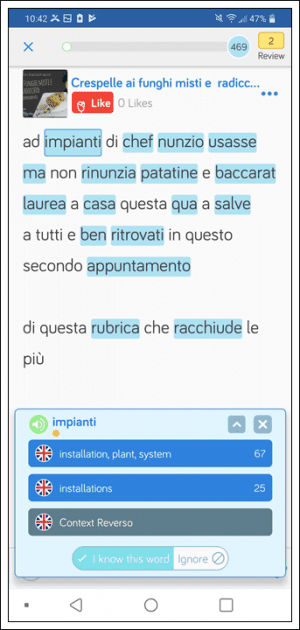Essential Italian Verbs: Essere and Avere
Verbs are a crucial part of any language. Try to make a sentence without using one and you will realize that they are truly indispensable. The more of them you know, the better you can express yourself. Having said that, there are two Italian verbs which can be considered the most useful due to their versatility. I am talking about “essere” and “avere”.
Italian Verbs
Essere – to be
“Essere, o non essere, questo è il dilemma” says Shakespeare’s Hamlet in the Italian translation of the famous quote. The “to be or not to be” monologue may not be essential for your language survival, but it contains arguably the most important verb in the Italian language. As luck would have it, this verb is also irregular. Without further ado, this is how “essere” conjugates.
The present tense (presente)
Singular: Plural:
Io sono – I am Noi siamo – We are
Tu sei – You are Voi siete – You are
Lui, lei è – He, she is Loro sono – They are
The past tense (imperfetto)
Singular: Plural:
Io ero – I was Noi eravamo – We were
Tu eri – You were Voi eravate – You were
Lui, lei era – He, she was Loro erano – They were
The future tense (futuro semplice)
Singular: Plural:
Io sarò – I will be Noi saremo – We will be
Tu sarai – You will be Voi sarete – You will be
Lui, lei sarà – He, she will be Loro saranno – They will be
Please remember that in Italian, unlike in English, the use of personal pronouns like io (I), tu (you) etc. with verbs is not required. On the contrary! It sounds artificial to use them as the form of the verb itself indicates who it is referring to.
The verb “essere” has multiple uses. Thanks to this Italian verb we can…
Talk about nationality:
Sono americano – I am American (singular, male)
Siamo brasiliane – We are Brazilians (plural, female)
Talk about feelings:
Ero arrabbiata – I was angry (singular, female)
Marta è stanca – Marta is tired (singular, female)
Introduce ourselves or someone else:
Sono Angela – I am Angela
Questo è mio marito – This is my husband
“Essere” is also used in various expressions:
Essere in ritardo – To be late: Siete in ritardo! – You are late! (plural)
Essere contro – to be against something: Siamo contro ogni discriminazione – We are against any discrimination
Essere in pensione – to be retired: Andre è gia in pensione – Andrea has already retired.
“Essere” can also be used as an auxiliary (“helping”) verb to form compound (composed of two or more parts) tenses. I know it may seem complicated but please don’t panic. You already know some compound tenses as they exist in English. Let us take Present Perfect as an example. In the sentence “I have just eaten”, the verb “have” is an auxiliary and in a way, helps the verb “eat” to convey a certain meaning. The idea behind Italian compound tenses is the same. To properly form sentences in them, you need to learn how to conjugate “essere” as shown above, in past (imperfetto), present (presente) and future (futuro semplice). “Essere” is used in the following frequently used compound tenses.
Past tense, passato prossimo
To form a sentence in passato prossimo you need an auxiliary verb in the present tense, in this case “essere”, and a form of the actual Italian verb we want to use called participio passato (e.g. uscire = uscito). Have a look at the following examples:
Sono andata al cinema ieri – I went to the cinema yesterday
Luigi è partito due settimane fa – Luigi left two weeks ago
Ci siamo divertiti un sacco – We had a lot of fun
Another past tense, trapassato prossimo
Trapassato prossimo uses a form of an auxiliary verb in a past tense (imperfetto) and a participio passato. You can think about this tense as an equivalent of Past Perfect in English e.g.
Quando Lino è venuto a casa nostra, ero già partita – When Lino came to our house, I had already left.
Future tense, futuro anteriore
Sentences in futuro anteriore are created by the use of an auxiliary verb in a future tense (futuro semplice) and a participio passato e.g.
Quando sarò diventata grande ti sposerò – When I grow up, I will marry you.
“Essere” is one of the two auxiliary Italian verbs which can be used in an appropriate form in compound tenses. In the vast majority of cases we use the verb “avere” (to have), which we are going to discuss shortly. “Essere” is required by many verbs of motion (andare – to go, venire – to come etc) and all reflexive verbs (alzarsi – to get up, svegliarsi – to wake up, etc). When you use “essere” in compound tenses you need to modify participio passato so that it reflects the gender and number of the subject, just like we do with adjectives in Italian:
Maria è andata via – Maria went away
Mario non è ancora venuto – Mario has not come yet
Avere – to have
“Avere” which means “to have” is arguably the second most useful verb in the Italian language. Unfortunately, it is also irregular. It conjugates in the following manner.
The present tense (presente):
Singular: Plural:
Io ho – I have Noi abbiamo – We have
Tu hai – You have Voi avete – You have
Lui, lei ha – He, she has Loro hanno – They have
Past tense (imperfetto)
Singular: Plural:
Io avevo – I had Noi avevamo – We had
Tu avevi – You had Voi avevate – You had
Lui, lei aveva – He, she had Loro avevano – They had
Future tense (futuro semplice)
Singular: Plural:
Io avrò – I will have Noi avremo – We will have
Tu avrai – You will have Voi avrete – You will have
Lui, lei avrà – He, she will have Loro avranno – They will have
We can use this Italian verb to express numerous things.
Possessing something literally:
Ho un cane – I have a dog
Sapevo che Giorgio aveva dei problemi – I knew Giorgio had problems
Expressions of possessing something in a figurative way:
Avere X anni – to be X years old: Hai 20 anni – You are 20 years old
avere fame – be hungry: Perché Gino ha sempre fame? – Why is Gino always hungry?
avere fretta – be in a hurry: Dai, Carla, ho fretta. – Come on, Carla, I am in a hurry.
avere bisogno di – to need something: Non abbiamo bisogno di te – We do not need you
avere caldo/freddo – be cold/hot: Hai freddo? – Are you cold?
There are many, many more!
“Avere”, just like “essere”, can also be used as an auxiliary to form compound tenses. It is, in fact, your “go to verb” to form correct sentences.
Past compound tense (passato prossimo)
Grazie, ho mangiato abbastanza – Thank you, I’ve eaten enough.
Another past compound tense (trapasassato prossimo)
Ho letto un libro che avevo comprato il mese scorso. – I read the book I had bought last month.
Future compound tense (futuro anteriore)
Ti chiamerò, quando avrò finito di lavorare – I will call you when I will have finished working.
To communicate successfully you definitely need more than two Italian verbs. And yet, every language learner has to start somewhere. Regardless of your level, make sure that you can conjugate these two Italian verbs correctly and that you know the expressions and sayings that they are used in. Knowing the grammar essentials cannot be overestimated!
Learn Italian faster, using content you love
We both know that being told what to study isn’t always fun, especially when it comes to learning Italian. Wouldn’t it be better to use content you love to help you improve your language skills?
That’s why I recommend LingQ to learn Italian online. Simply put, LingQ comes equipped with 100s of lessons that have been transcribed and recorded by native Italian speakers. They’re easy to read and follow thanks to LingQ’s interface which also allows you to look up words with a single tap!

Not only does LingQ come equipped with loads of content, but also, you can import Italian content you enjoy into the app too! Turn your favorite Italian YouTuber videos, audiobooks, and much more into interactive lessons.
Try it for free today, LingQ’s language learning apps are available for both Android and iOS. Good luck!
***
Magdalena Osiejewicz-Cooper has lived in Bologna and Palermo. Apart from Italian she speaks fluent Polish and French. She is currently self-studying Spanish.

